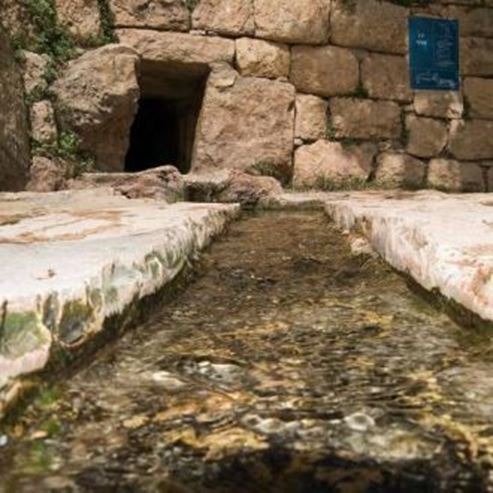From Ein Sataf To Ein Karem Track
Straight walking path
This part of the trail leads the hikers to the Jerusalem Mountains. Here you will find remains of ancient terraces and small springs, surrounded both by native and planted forests. The Israel Nature and Parks Authority preserves and maintains the area around the trail, and invites you to enjoy it.
Main Points of Interest:
Traditional mountain agriculture
Tunnel springs
Mediterranean woodland
Ein Karem sites
An enormous terrace near Ein Handaq
Scenic Lookouts:
Sataf
A lookout over Ein Karem
The Nature and Parks Authority’s Actions to Improve Service to the Visitors
The Authority designed and marked the Jerusalem Trail.
Getting to Sataf
Arriving from the west: from highway 1 (Tel-Aviv - Jerusalem) turn south at the Harel interchange, pass through Maoz Zion, and proceed to Sataf (Har Eitan) Junction. From there a paved road leads to the Sataf parking lots. The Sataf Junction can also be reached via highway 395 from the Eshtaol Junction.
Arriving from Jerusalem: highway 395 from Ein Karem to Sataf Junction.
Getting to Ein Karem
From Jerusalem: at Mount Herzl turn west and descend to Ein Karem.
From the west: on highway 395 turn left at the roundabout of the Kerem Junction. The destination point is Mary's Spring, Maayan Street, Ein Karem.
Background
The Jerusalem Trail is a 39-km hiking trail. The trail completes the missing part of the Israel National Trail that bypasses the capital city. It begins at Ein Handaq, from there ascending to Ein Karem and Mount Herzl, crossing Beit HaKerem, and turning back west around the Old City to reach Sataf via Lifta, Arazim Valley and Mount Harat – thus almost making a full circle.
The Jerusalem Trail is marked blue-gold-blue, at places with the lion symbol of Jerusalem added to the markings. Outside the city limits the trail markings merge with those of the nature trails. The segment between Sataf and Ein Handaq is part of the Jerusalem Trail.
The Trail Route
1. From Sataf to Ein Handaq
Start at the upper parking lot at the Sataf site, next to the coffee house, and walk following the Israel National Trail. Walk down a short flight of stairs, and about 100 meters past it arrive at the Israel National Trail information booth. From here follow the Israel National Trail markings (and green trail markings).
The trail descends among terraces, and olive and almond trees. From its upper part you will be able to see the Aminadav ridge, Nahal Sorek, Monastery of St. John in the Wilderness, moshav Even Sapir and the Hadassah Ein Kerem Hospital. Along the trail are small cliffs with cave openings blocked by stone walls – in the past these caves were used for storage by the residents of the Arab village Sataf.
The trail descends towards the Ein Sataf spring and its pretty collecting pool, which gathers the water trickling from it. You can climb up to the stone step above the pool, enter the spring tunnel and exit from its other end next to the pool. This adventure is recommended for the young and the young-at-heart, who are prepared to crawl through the narrow tunnel and get their feet slightly wet.
The Israel National Trail passes among gardens, down a long flight of stairs, towards the lower parking lot of the Sataf site. There turn left through partially a paved and uneven dirt road. In the beginning of summer, until June, the large dog-rose and Spanish-broom bushes are in bloom, alongside the tender dragon flowers.
Near the pine-tree grove the Israel National Trail meets another trail marked in black, leaving Nahal Sorek and entering a small grove of native trees. Immediately afterwards it passes over a small bridge, safely passing under highway 386 (Ein Karem - Bar Giora).
From here the trail proceeds along Wadi Yusuf, leading to a vast terrace made of enormous stones resembling those of the Western Wall. Its location makes it likely to be part of an ancient irrigation-farming system that used the water from Ein Handaq some 400 meters upstream. However, its size can also hint at its having served as a construction site of a state project, and not necessarily an agricultural installation.
From here climb the small step stones at the riverbank. A small canal along the left side of the trail was used in the past to deliver water from Ein Handaq to the fields in the gorge. Next is a large moat in the rock, with two tunnel openings – this is Ein Handaq, one of the most beautiful springs in the Jerusalem Mountains.
Its water flows out of the two openings into a large collection pool carved in the rock. The southern tunnel is longer than the eastern one, collecting water from two branches that meet next to a small dam. The dam raises the water level, with gravity allowing the water flow into the pool. The entrance into this tunnel is very narrow.
The eastern tunnel is actually a combination of two interconnected tunnels – one 17 meters long, and the other, branching out of the first, is 31 meters long. The tunnels are completely dark, and the water level inside them may reach 1.2 meters. There are no safety provisions or markings inside the tunnels, and those entering them do so solely at their own risk.
2. From Ein Handaq to Mary's Spring
At Ein Handaq we leave the Israel National Trail, and begin following the Jerusalem Trail (marked blue-gold-blue). The trail climbs up a paved road away from the spring. This segment of the trail is part of the Hadassah trail system, which was developed with the help of Jewish National Fund.
At the point where the paved road bends to the right, the Jerusalem Trail diverges from it and continues along a dirt road, parts of which are laid with rocks (a “macadam” road). Further on the left side are clear remains of a guards’ booth – a small stone construction that used to serve farmers during the high season. The booth builders must have enjoyed the magnificent view of Mount Harat and Mount Tzova in front of them. From the steep slope leading down to Nahal Sorek you can see other such booths, as well as beautiful agricultural terraces.
A short distance from here the Jerusalem Trail diverges from the paved road, and proceeds to the right and up wooden steps above abandoned terraces. Soon we reach the road leading to the Hadassah Ein Kerem Hospital. Here the mission is to very carefully cross the busy highway 396. The trail turns to the left along a dirt road; a green iron gate blocks the road named after Heidi Sternbach, and the open road is marked in blue.
The Jerusalem Trail now passes through a grove of pine trees, and then skirts around the hospital to its left. The beauty of this trail segment is in the magnificent view of Ein Karem, complete with all its monasteries and churches.
When you reach a paved road again, it means that you have reached the outskirts of Ein Karem. Turn right, passing by the famous Church of the Visitation. Christian tradition has it that this was where Mary, mother of Jesus, visited Elizabeth, mother of John the Baptist – and the church is a memorial to this event.
The Ein Karem spring, which emanates from a tunnel in the rock, is not too far away from this point. Here, at the foot of the old village’s mosque, is where the trip ends.
- Type
- Hiking
- Region
- Jerusalem Area
- Locality
- Jerusalem
- Length
- 7 Km
- Duration
- 3 Hours
- Recommended season
- Spring, Summer, Autumn, Winter
- Starting point
- Sataf, Jerusalem Mountains (map)
- Ending point
- Ein Karem, Jerusalem (map)
- Special equipment
- Shoes, hat, water. Enter the Ein Handak Tunnel: flashlight, water walking shoes
- Precautions
- Be careful crossing Route 396 before Ein Kerem
- Parking
- Parking
- Drinkable water
- Drinkable water
- Suitable for children
- Suitable for children
- Picnic suitable
- Picnic suitable
- Phone
- +972-2-6232191
- Fax
- +972-2-5795274
- mh.har@npa.org.il
Similar trails







Nearby attractions







Nearby restaurants

Cafe Hillel - Hadassah Ein Kerem

Ma'afe Neeman-Hadassah Shopping Center, Ein Karem, Jerusalem


Burgers Bar- Hadassah Ein Kerem



